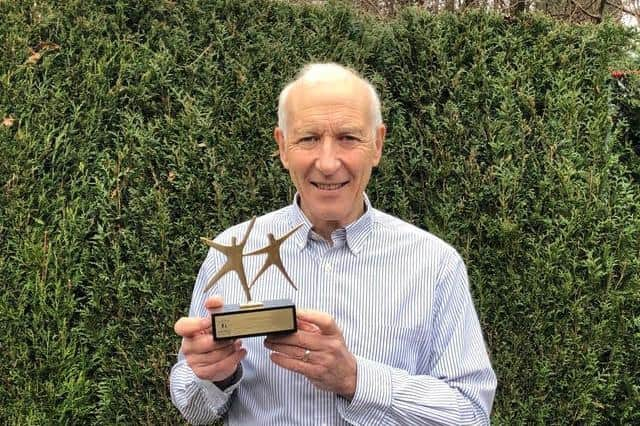Preston man who beat the odds to survive is given top international award after dedicating his retirement to helping people with rare diseases
and live on Freeview channel 276
Graham Slater, who was born in a city nursing home in November 1953, was operated on at six days old at Manchester Children's Hospital for oesophageal atresia, a condition where the food pipe is not connected properly and the person cannot swallow.
He was the first child to have survived an operation to rectify the problem by pioneering surgeon Ambrose Jolley, and at that time, one of only a few in the UK.
Advertisement
Hide AdAdvertisement
Hide Ad>>>Click here for information on Rare Disease Day on February 28.


He said: "Fixing it is very complex, even today.
"So I've been very lucky, as most people born with that condition at the time did not survive, or did not survive very long.
"When I retired from work, I decided to get involved in volunteering and give something back."
Around 14 years ago, after a career in aerospace and IT, Graham got involved with TOFS, a patient organisation for people with the condition in the UK.
Advertisement
Hide AdAdvertisement
Hide AdHe was then instrumental in founding an international organisation for the condition known as EAT, then got involved with Eurodis, an umbrella organisation for thousands of rare diseases across the world.
His work - primarily to make sure that patient's voices are heard and helping to direct priorties for clincian's research - has seen him travel extensively across the world and takes up around 1,200 hours of his time a year.
International award
This week he was awarded a Eurodis Black Pearl Award in recognition of his volunteering.
The 68-year-old, who grew up in Longridge but now lives in Worcestershire, said: "I'm really honoured, it reflects on what I've tried to do. And I'm ever so grateful to all of my colleagues; they are part and parcel of it all."
Advertisement
Hide AdAdvertisement
Hide AdHe added: "What's staggered me is the scale. There's about 900 member organisations in Eurodis and thousands of people doing voluntary work.
"I've learnt how blumming inspirational these people are. It's inspirational how they manage their own condition and manage to help others.
"So it's truly amazing that amongst all of that, I was nominated for and won the award."
The award judges said: "The significance of your input and action in the rare disease field cannot be overstated, and we believe you are a truly deserving recipient of this award.”
"Exceptionally lucky"
Advertisement
Hide AdAdvertisement
Hide AdGraham says he has been "exceptionally lucky" that he has required very little monitoring for his condition since being a child.
Around 190 babies a year are born with the condition in the UK - around 1 in every 3,500 births.
Although it is know not to be hereditary, what causes it to happen as a baby develops in the womb is not properly understood.
For more information on the condition, click here.
Comment Guidelines
National World encourages reader discussion on our stories. User feedback, insights and back-and-forth exchanges add a rich layer of context to reporting. Please review our Community Guidelines before commenting.